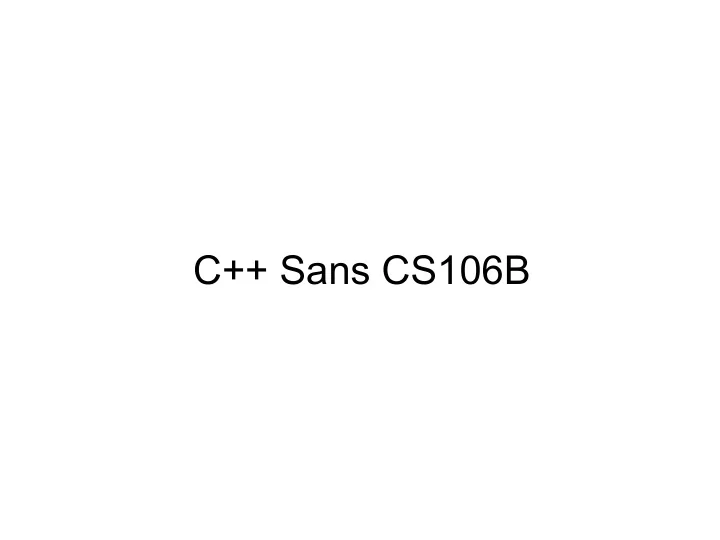

C++ Sans CS106B
Demystifying genlib.h
Simplified genlib.h Contents #ifndef _genlib_h #define _genlib_h #include <string> using namespace std; void Error(string str); #endif
Simplified genlib.h Contents #ifndef _genlib_h #define _genlib_h #include <string> using namespace std; void Error(string str); #endif
Simplified genlib.h Contents #ifndef _genlib_h #define _genlib_h #include <string> using namespace std; void Error(string str); #endif
Simplified genlib.h Contents #ifndef _genlib_h #define _genlib_h #include <string> using namespace std; void Error(string str); #endif
#include <iostream> int main() { cout << "C++ FTW!" << endl; return 0; }
The Standard Namespace ( namespace std ) cout endl string cin #include <iostream> int main() { cout << "C++ FTW!" << endl; return 0; }
The Standard Namespace ( namespace std ) cout endl string cin #include <iostream> Impenetrable barrier! int main() { cout << "C++ FTW!" << endl; return 0; }
The Standard Namespace The Standard Namespace ( namespace std ) ( namespace std ) cout endl string cin #include <iostream> using namespace std; Impenetrable barrier! int main() { cout << "C++ FTW!" << endl; return 0; }
Summary of genlib.h ● Includes the standard string type through #include <string> ● Prototypes Error . ● Imports standard names with using namespace std;
The Standard Template Library (STL)
STL Hierarchy
STL Hierarchy CONTAINERS
STL Hierarchy ITERATORS CONTAINERS
STL Hierarchy ALGORITHMS ITERATORS CONTAINERS
STL Hierarchy FUNCTORS ALGORITHMS ADAPTERS ITERATORS CONTAINERS ALLOCATORS
STL Containers ● Standard C++ version of the CS106 ADTs. ● Nothing fundamentally new – skills from CS106 transferable with some name changes. ● No Grid , sorry...
CS106 Vector to STL vector
CS106 Vector to STL vector #include "vector.h" #include <iostream> using namespace std; const int NUM_INTS = 10; int main() { Vector<int> v; for(int i = 0; i < NUM_INTS; i++) v.add(i); for(int i = 0; i < v.size(); i++) cout << v[i] << endl; }
CS106 Vector to STL vector #include <vector> #include <iostream> using namespace std; const int NUM_INTS = 10; int main() { Vector<int> v; for(int i = 0; i < NUM_INTS; i++) v.add(i); for(int i = 0; i < v.size(); i++) cout << v[i] << endl; }
CS106 Vector to STL vector #include <vector> #include <iostream> using namespace std; const int NUM_INTS = 10; int main() { vector<int> v; for(int i = 0; i < NUM_INTS; i++) v.add(i); for(int i = 0; i < v.size(); i++) cout << v[i] << endl; }
CS106 Vector to STL vector #include <vector> #include <iostream> using namespace std; const int NUM_INTS = 10; int main() { vector<int> v; for(int i = 0; i < NUM_INTS; i++) v.push_back(i); for(int i = 0; i < v.size(); i++) cout << v[i] << endl; }
foreach is a CS106B-specific invention.
That means that there is no foreach in the STL.
Instead, the STL uses iterators .
STL Iterators ● Generalization of a pointer. ● Used to iterate over containers. ● More verbose than foreach , but more powerful.
Basic Iterator Patterns
Basic Iterator Patterns Vector<int> myVector; foreach(int x in myVector) cout << x << endl;
Basic Iterator Patterns Vector<int> myVector; foreach(int x in myVector) cout << x << endl; vector<int> stlVec; for(vector<int>::iterator itr = stlVec.begin(); itr != stlVec.end(); ++itr) cout << *itr << endl;
Basic Iterator Patterns Vector<int> myVector; foreach(int x in myVector) cout << x << endl; vector<int> stlVec; for( vector<int>::iterator itr = stlVec.begin() ; itr != stlVec.end(); ++itr) cout << *itr << endl;
Basic Iterator Patterns Vector<int> myVector; foreach(int x in myVector) cout << x << endl; vector<int> stlVec; for(vector<int>::iterator itr = stlVec.begin(); itr != stlVec.end(); ++itr) cout << *itr << endl;
Basic Iterator Patterns Vector<int> myVector; foreach(int x in myVector) cout << x << endl; vector<int> stlVec; for(vector<int>::iterator itr = stlVec.begin(); itr != stlVec.end(); ++itr ) cout << *itr << endl;
Basic Iterator Patterns Vector<int> myVector; foreach(int x in myVector) cout << x << endl; vector<int> stlVec; for(vector<int>::iterator itr = stlVec.begin(); itr != stlVec.end(); ++itr) cout << *itr << endl;
Basic Iterator Patterns Vector<int> myVector; foreach(int x in myVector) cout << x << endl; vector<int> stlVec; for(vector<int>::iterator itr = stlVec.begin(); itr != stlVec.end(); ++itr) cout << *itr << endl;
Basic Iterator Patterns Vector<int> myVector; foreach(int x in myVector) cout << x << endl; vector<int> stlVec; for(vector<int>::iterator itr = stlVec.begin(); itr != stlVec.end(); ++itr) cout << *itr << endl; for(vector<int>::iterator itr = stlVec.begin(); itr != stlVec.end(); ++itr) *itr = 137;
Basic Iterator Patterns Vector<int> myVector; foreach(int x in myVector) cout << x << endl; vector<int> stlVec; for(vector<int>::iterator itr = stlVec.begin(); itr != stlVec.end(); ++itr) cout << *itr << endl; for(vector<int>::iterator itr = stlVec.begin(); itr != stlVec.end(); ++itr) *itr = 137; set<int> stlSet; for(set<int>::iterator it = stlSet.lower_bound(3); it != stlVec.upper_bound(137); ++it) cout << *it << endl;
STL Algorithms ● No parallel in the CS106 libraries. ● 75 generic algorithms to apply to ranges of data. ● Usually operate on iterator ranges.
STL Algorithms Example vector<int> v; const int NUM_INTS = 200; v.resize(NUM_INTS); generate(v.begin(), v.end(), rand); sort(v.begin(), v.end()); if(binary_search(v.begin(), v.end(), 137)) cout << "Found 137!" << endl; else cout << "Awww..." << endl;
STL Algorithms Example vector<int> v; const int NUM_INTS = 200; v.resize(NUM_INTS); generate(v.begin(), v.end(), rand); sort(v.begin(), v.end()); if(binary_search(v.begin(), v.end(), 137)) cout << "Found 137!" << endl; else cout << "Awww..." << endl;
More STL Algorithms bool IsPalindrome(string str)
More STL Algorithms bool IsPalindrome(string str) { return equal(str.begin(), str.end(), str.rbegin()); }
Even More STL Algorithms string ConvertToUpperCase(string str)
Even More STL Algorithms string ConvertToUpperCase(string str) { transform(str.begin(), str.end(), str.begin(), ::toupper); return str; }
More STL Algorithms Than That vector<vector<int> > AllPermutations(vector<int> input)
More STL Algorithms Than That vector<vector<int> > AllPermutations(vector<int> input) { vector<vector<int> > result; sort(input); do result.push_back(input); while( next_permutation(input.begin(), input.end()) ); return result; }
Summary of the STL
Containers store data .
Iterators define ranges .
Algorithms let you sleep earlier .
Recommend
More recommend